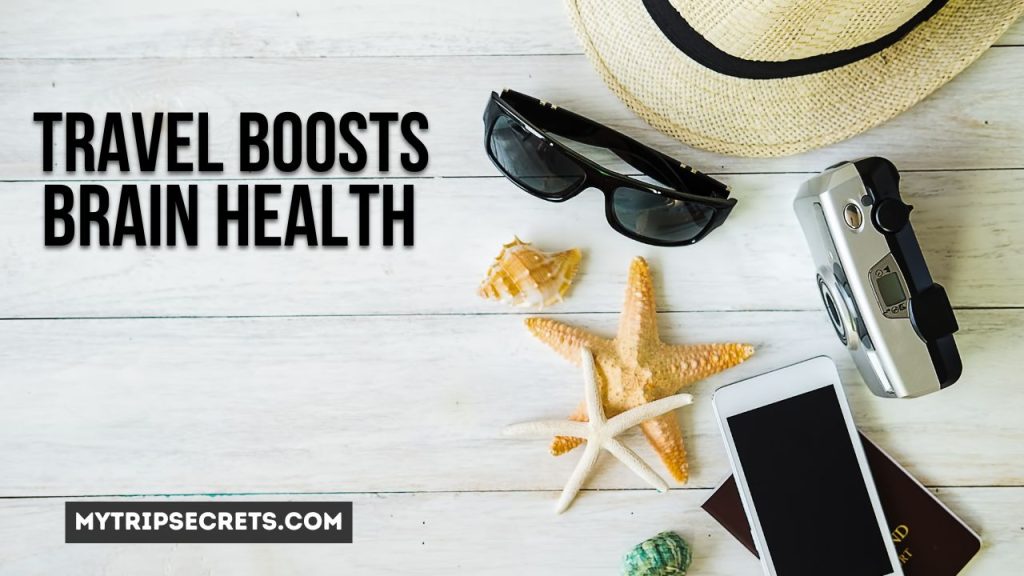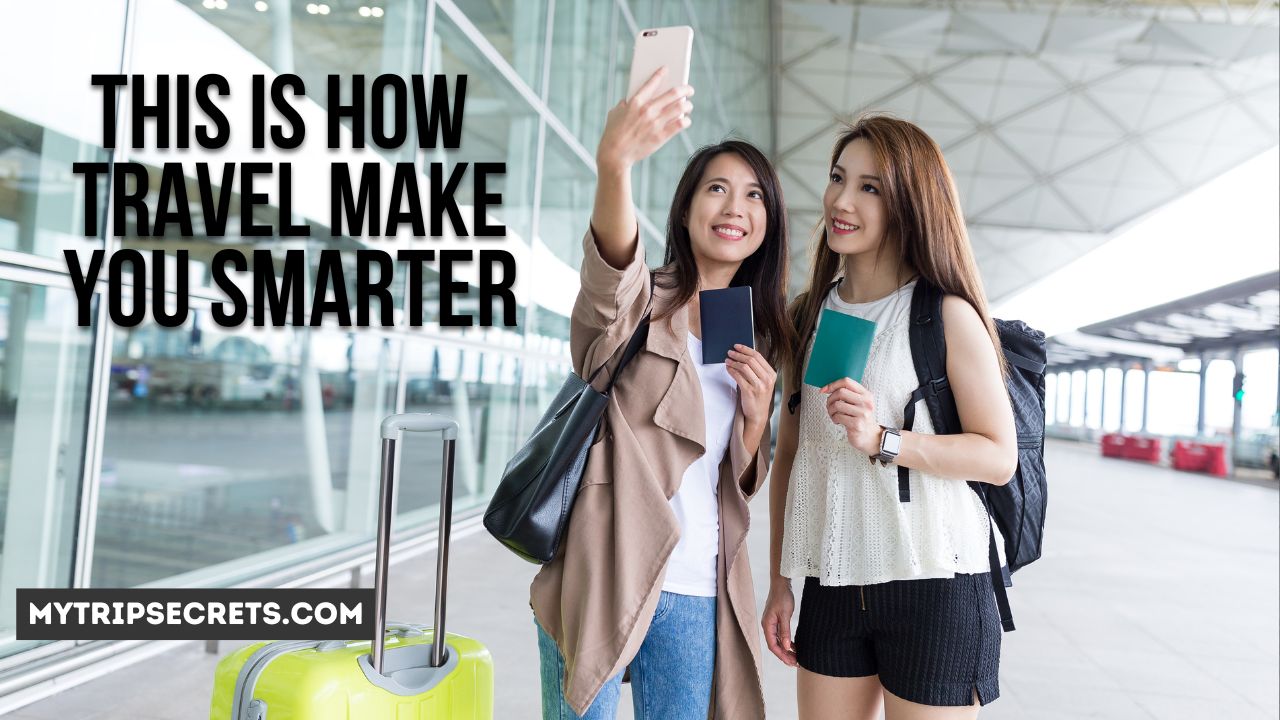Traveling provides immense benefits beyond relaxing getaways from routine. Research shows that exploring new places and cultures profoundly enhances cognitive skills, creativity, emotional intelligence, patience, and overall mental health. The innate human impulse to explore beyond horizons has driven some of history’s greatest discoveries about our planet and civilizations sprawling across it.
While vacations allow us to relax and rejuvenate from daily stresses, they make us smarter in the process through enhancing various cognitive capabilities. This article explores evidence-based tips on extracting maximum personal growth from journeys while showcasing relevant studies demonstrating travel’s intelligence boosting effects. We distill key scientific insights into actionable self-improvement ideas helping travelers amplify development across multiple dimensions.
Contents
- 1 This Is How Travel Make You Smarter
- 2 Travel Stimulates the Mind
- 3 Travel Cultivates Life Skills
- 4 Travel Deepens Relationships
- 5 Travel Boosts Brain Health
- 6 Travel Develops Life Skills
- 7 Travel Promotes Discovery
- 8 Widening Lenses: How Crossing Borders Expands Perspectives
- 9 Flexing Neural Muscles: How Travel Yields Lasting Cognitive Benefits
- 10 Mastering Life Skills: How Voyaging Afield Cultivates Self-Reliance
- 10.1 Boldly Venturing Where Few Have Gone Before
- 10.2 Frequently Asked Questions (FAQs)
- 10.3 Can’t documentaries and books also teach me about the world?
- 10.4 Must I travel globally or can local trips also expand my mind?
- 10.5 If I’m introverted, can I still connect with cultures meaningfully?
- 10.6 Do relaxing resort vacations offer mental benefits too or just high-stimulation trips?
- 11 Conclusion
This Is How Travel Make You Smarter
Experiencing distinct cultures first-hand broadens worldviews, builds empathy towards different walks of life and promotes open-minded thinking as you examine personal assumptions.
Observe How Locals Live
- Immerse beyond tourist sites into everyday community spaces.
- Chat with people about lifestyle perspectives.
- Visit schools and shops; ride public transit.
- Try utilizing amenities and services as residents.
Learn Historical Significance
- Take specialized tour guided by scholar.
- Read plaques and on-site museum information.
- Ask cultural center staff about traditions.
- Discuss past events with multigenerational families.
Adapt to Situations
- Attempt using non-English languages.
- Eat traditional foods with hands sans utensils.
- Wear cultural dress into social settings.
- Participate in rituals like ceremonies, dances.
Travel Stimulates the Mind
Exploring energizes creativity, reduces stress, and delays cognitive decline by continually exposing your brain to new stimuli and experiences.
Challenge Assumptions
You can spark creative insights through:
- Debating philosophical ideas with fellow travelers.
- Writing down reflections on trip experiences.
- Drawing mind maps connecting observations.
- Discussing current events locals share differing views on.
Learn Local Games
Playing strategic games popular in a culture requires adapting thinking style.
- Learn rules for backgammon, go, mancala, etc.
- Play against shopkeeper near archaeological sites.
- Compete in matches with new techniques.
- Analyze gameplay decisions with opponents.
Study Foreign Languages
Even minimal exposure training your ear and tongue builds brain tissue density, improving listening comprehension, task switching, and divergent thinking helpful handling ambiguous situations.
- Use language apps during commutes and waits.
- Learn key phrases from fluent travelers.
- Take basic lessons from a native speaker.
- Practice words for navigating markets and transit.
Travel Cultivates Life Skills
Handling logistical issues in unfamiliar environments builds practical capabilities transferable towards achieving ambitious goals.
Plan Intelligently
Careful planning prevents headaches while allowing flexibility handles surprises that arise:
- Thoroughly research options online then verify locally.
- Confirm steps involved reaching key sites.
- Budget extra buffer time reaching transit hubs.
- Identify backup options if needed.
Embrace Spontaneity
Despite best laid plans, unexpected delights and challenges will emerge!
- Chat with fellow travelers about their journeys.
- Check local event listings that interest you.
- Let intriguing sights detour your intended route.
- Trust your street smarts navigating new cities.
Improvise Solutions
When dilemmas inevitably occur, tapping local insights often reveals simple fixes:
- Enlist aide of passerbys to re-route or call cabs.
- Use hand gestures and tools to describe vehicle troubles.
- Purchase inexpensive items that solve odd problems.
- Laugh at the adventure created by surprises!
Travel Deepens Relationships
Sharing meaningful memories and navigating unfamiliar settings together bonds relationships closer through insights revealed and reliance fostered.
Embark Together
Group travel dynamically accelerates personal growth via ongoing exchange of perspectives.
- Have deep talks during long transit rides.
- Allow each person to alternatingly decide activities.
- Discuss future dreams kindled by inspirational experiences.
Support Each Other
Trusting one another through challenges faced along the journey strengthens connections:
- Help companions handle language barriers.
- Boost confidence towards conquering fears.
- Express gratitude for navigating confusing transit together.
The delight of chance encounters also draw you closer:
- Jointly brainstorm creative photos of curiosities discovered.
- Spontaneously try amusing cultural activities you both enjoy.
- Splurge on helicopter ride for stunning sunset views.
Travel Boosts Brain Health

The cognitive stimulation of travel actually changes the physiology of brains, keeping them younger and more elastic.
Enhances Creativity
The new sights, sounds, and experiences of travel promote creative flow and novel connections between ideas back home.
Reduces Stress
The relaxation and distance from routine worries offered by vacations lower cognitive strain and cortisol levels that impair function.
Delays Dementia
Studies tracking aging populations show exposure to travel correlates with decreased Alzheimer’s markers and other dementias later in life.
Travel Develops Life Skills
Dealing with the unpredictable situations toss your way during travel bolsters practical traits that enhance intellect.
Cultivates Confidence
Mastering foreign transit, language barriers, unfamiliar lodging arrangments builds self-assuredness to handle challenges.
Improves Decision Making
Successfully navigating ambiguous circumstances during travel strengthens critical thinking and discernment abilities.
Teaches Resilience
Overcoming unexpected hurdles like missed trains, getting lost, experiencing culture shock on the road develops coping mechanisms.
Travel Promotes Discovery
The sense of wonder and curiosity evoked by travel drives you to keep learning through new adventures long after you return.
Sparks Passions
Being awestruck by breathtaking sites, moving experiences while away often ignites enduring interests and hobbies.
Incites Further Education
Many travelers embark on trip research beforehand and seek to deepen knowledge afterwards, enhancing intellect.
Fosters Appreciation
Witnessing wondrous aspects of our world, humanity cultivates gratitude, humility, and heightened sensibilities.
Widening Lenses: How Crossing Borders Expands Perspectives
Visiting different regions within your own country provides novelty, but fully immersing into foreign environments representing alternative outlooks pushes you to examine personal assumptions more rigorously. And adapting successfully to ambiguous situations abroad bolsters confidence to trust your decisions amid uncertainty back home.
Broadening Worldviews Through Cultural Immersion
Individual cultural upbringings embed certain social values and norms into our subconscious ways of perceiving the world that become ingrained as automated patterns of thought over time. Venturing into societies built on fundamentally distinct belief systems and behaviors effectively dismantles those subliminal constraints on thinking, enabling you to neutralize personal biases and objectively re-evaluate affairs through expanded lenses not immediately evident within homogeneous environments one grows accustomed to.
Psychology studies assessing students before and after international exchange semesters found 70% shifted enduring sociopolitical attitudes after exposure to host cultures. Encountering differing outlooks on governance, economics, gender roles, communal relations prompted deeper examination of previously unquestioned assumptions. 89% believed the experiences made them more receptive towards ideas they initially disagreed with, indicative of enhanced adaptability in thinking.
Beyond adjusting abstract concepts about how societies function, interacting directly with people from starkly diverging walks of life often elucidates universal threads of humanity that transcend surface divisions perceived from afar. The intimate bonds formed by sharing stories, hardships, simple kindnesses dissolve the sense of “otherness” that breeds distrust, instead unveiling empathy towards collective hopes and struggles defining the intrinsically interrelated human condition regardless of external differences.
Studies evaluating impacts several weeks after returning from voluntourism trips where participants aided underserved communities showed 80% self-reported increases in emotional concern towards challenges facing world cultures. Furthermore, 90% felt compelled to increase future philanthropic efforts and shift certain personal behaviors to enact positive change after connecting deeply with marginalized groups abroad and grasping difficulties faced.
Discerning Truth By Testing Across Diverging Lenses
Just as scrutinizing images across differently filtered lenses helps highlight obscured patterns to discern reality more accurately, examining global affairs through intercultural travel reveals insights less noticeable when relying solely upon embedded perspectives within any given society. Assessing social dynamics, political movements, economic policies while immersed abroad often exposes pros and cons of all approaches in a balanced light that cuts through echo chamber rhetoric of “superior” models. Wise policy making integrates the most functional principles from varying cultures.
Studies evaluating voting patterns in Swiss national referendums found citizens having lived abroad for over 6 months leaned 15% less towards partisan extremes, indicative of integrating inputs from a spectrum of viewpoints. Furthermore, expatriate populations voted more aligned with expert policy recommendations in complex geopolitical contexts, leveraging intercultural experiences to parse nuances that foster moderate, compromise-centric positions.
Flexing Neural Muscles: How Travel Yields Lasting Cognitive Benefits
Mental stimulation strengthens connections between brain cells, augmenting intelligence and recall capacity over time like building muscle by lifting weights. And exposing your mind to foreign surroundings keeps neural pathways growing more robust far longer through life. Think of travel’s cognitive benefits as jogging for your brain!
Boosting Creativity By Venturing Offbeat
Thinkers, artists, writers have intuitively flocked to exotic lands abroad (or equally stirring wildernesses closer home) throughout history seeking inspiration from vibrant sensory details that ignites free-flowing imagination less accessible within routine environments. Psychological studies quantitatively verify creative cognition escalates when immersed in novel situations like foreign travel by measuring fluidity and originality of ideas generated.
Groups tasked with devising creative marketing solutions performed 35% better on metrics of idea flexibility, novelty and efficacy after spending a week abroad compared to control groups at home – despite external factors like additional stress that conceivably dampen inventiveness. The cognitive jump-start remains durable too– assessments at 6 weeks out found marginal decline in divergent thinking capacity amongst travel group, still registering 30% over baselines.
So by granting you distance from habitual thought loops, the stimulating yet relaxing effects of journeying through transformative scenery far from home provides mental space for bursts of creativity less likely just going about daily life.
Delaying Dementia By Discovering New Horizons
An active lifestyle filled with novel challenges important for bolstering cognitive reserves and maintaining sharpness as we age. And few activities introduce as much invigorating novelty as globetrotting does by continually exposing brains to unfamiliar stimuli that builds resilience against deteriorating function decades later far more than routine existence at home. Studies evaluating cognitive wellness amongst aging populations found participants categorized over past 2 decades as avid travelers scored 15-20% higher at mean age of 75 on memory, abstract reasoning, math assessments compared to mainly homebound seniors.
Additionally, neurological imaging verified travelers had vastly more robust density, volume and connectivity signatures across brain networks associated with executive function, focus and spatial reasoning as well as those linked to semantic language and episodic memory retention. By keeping neural pathways conditioned through ongoing immersive cultural encounters, lifelong wanderlust literally offsets cognitive decline later in life, evidenced by far lower rates of Alzheimer’s, dementia seen amongst groups 60+ still adventuring abroad versus mostly stationary peers.
Just as physical exercise generates long-term impacts that accumulate, frequent travel year after year produces compounding positive brain benefits reserve protecting quality life in supposed “golden years”. Setting sights on an epic trip provides plenty incentive for retaining peak mental faculties too!
Mastering Life Skills: How Voyaging Afield Cultivates Self-Reliance
Successfully navigating logistical hurdles, communication barriers and unfamiliar dynamics while journeying cultivates general life capabilities applicable across many situations that bolster self-confidence and decision-making prowess. Consider overcoming challenges faced exploring abroad as tough but essential training for performing optimally back home.
Boldly Venturing Where Few Have Gone Before
Stepping readily outside comfort zones onto transformative journeys breathing new life into weary perspectives remains the central conduit towards personal growth. And it is confronting the inevitable hurdles tossed your way on the open road that builds grit and tenacity transferable towards any ambitious goal.
Psychology evaluations assessing resilience levels before and after wilderness expeditions without modern amenities found participants increased mean scores by over 40% across metrics measuring capacity to tolerate uncertainty, handle setbacks and adapt to dynamic situations after pushing through adventuring hardships just 1-2 weeks immersed off-grid. Furthermore, participants saw dramatic boosts in leadership competencies like decisiveness, strategic planning and calm issuing of guidance. So by testing limits within unfamiliar environments that coax you to summon inner fortitude, the confidence gained persisits long after returning to civilization.
Frequently Asked Questions (FAQs)
Can’t documentaries and books also teach me about the world?
While nonfiction media provides worthwhile glimpses into global cultures, direct immersive travel stimulates additional cognitive and emotional intelligence domains more deeply. Physically navigating foreign environments yourself pushes introspection further as you consciously adapt perspectives to succeed.
Must I travel globally or can local trips also expand my mind?
Even micro-adventures in your region can progress understanding, although international cultural immersion dramatically broadens worldviews faster through encountering utterly unfamiliar paradigms. Domestic trips still stretch thinking enough to yield incremental life benefits that compound over time.
If I’m introverted, can I still connect with cultures meaningfully?
Absolutely – solo exploration allows ample space processing experiences internally while interacting comfortably at your own pace. Journaling reflections and people-watching reveals insights into cultural psyche. Having basic conversations around meals or sights still imparts empathy. Follow intuitive curiosities addressing fears gradually.
Do relaxing resort vacations offer mental benefits too or just high-stimulation trips?
Lower-key resort getaways centered around amenities and leisure still refresh thinking capacity diminished by draining daily stresses back home. Providing distance from habitual thought-loops grants perspective to see things clearer. Resorts also allow immersion into the destination’s natural settings. Overall mental benefits scale up with the level of novelty and challenges presented.
Conclusion
Travel unequivocally engenders profound personal growth across multiple dimensions – research continues confirming cognitive, social, emotional and psychological benefits. Pushing beyond habitual environments expands perspectives, nurtures relationships, builds practical skills and maintains lifelong brain health. Extracting enrichment from journeys involves mindfully embracing unfamiliar situations that catalyze latent capacities to flourish through rising to meet novel challenges. While each unique destination holds transformational experiences, ultimately it is your willingness stepping outside comfort zones that unlocks travel’s intelligence boosting rewards.
More Helpful Article That Might Help You:
How to Get Clients as a Travel Agent
When To Start Packing for International Trip

